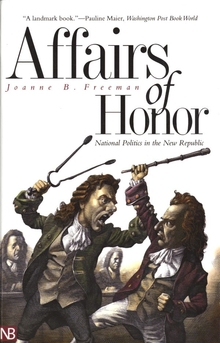The Contingency of the Present Moment
I’m ending the month with an extract from an essay by Joanne B. Freeman, professor of history at Yale and cohost of the Now and Then podcast, that recently appeared in The Atlantic.
Freeman’s book Affairs of Honor, about personal politics in early America, helped to inform the treatment of dueling in Lin-Manuel Miranda’s Hamilton musical. Her more recent The Field of Blood examined violence in the ante-bellum Congress.
Naturally, Freeman dislikes the sight of elected officials encouraging, applauding, or excusing attempts to win political disputes through violence.
As to what’s at stake, she writes:
Freeman’s book Affairs of Honor, about personal politics in early America, helped to inform the treatment of dueling in Lin-Manuel Miranda’s Hamilton musical. Her more recent The Field of Blood examined violence in the ante-bellum Congress.
Naturally, Freeman dislikes the sight of elected officials encouraging, applauding, or excusing attempts to win political disputes through violence.
As to what’s at stake, she writes:
I also know that before the United States can move ahead, it has to reckon with its past. It has to acknowledge the often profoundly deep roots of modern injustices, and recognize the long-standing assumptions and traditions that have made us who we are, for better and worse. America’s national identity is grounded in a shared understanding of American history—the country’s failures, successes, traditions, and ideals. Shape that narrative and you can shape a nation.The American Revolution laid the seed for modern democracy on this continent and around the world. It also provided the foundation for a society based for nearly two centuries on slavery and profound inequality. That both of those propositions are true shows how no outcome was guaranteed.
During times of intense change, that narrative has more power still. Thus the current outrage over the telling of our history. The United States is having a full-fledged identity crisis, and given the high stakes, the ownership of national history has become urgent and immediate. Culture war doesn’t begin to do this struggle justice. It is a battle for the soul of America and the survival of democracy, as many Americans know all too well.
This is not a battle of abstractions. It’s a deeply personal fight about inclusion and exclusion. We’re determining whose history counts and whose voices get heard, and reckoning with the many ways in which injustices—and ideals, met and unmet—have made us who we are. The fury of this debate grows from its implications. It’s an argument over what we want the United States to be. . . .
As I’ve taught time and again in college classrooms, the founding generation didn’t know if it would win the Revolution or if the new nation would survive; Hamilton makes this abundantly clear. People were living in the moment, much like us today.
The lesson to be learned from this is vitally important. As much as we might like to, we can’t assume that all will be fine in the end. America’s long-standing faith in its exceptionalism is blinding people to the fact that our constitutional order is fragile, that democracy requires hard work, and that success isn’t a given.


1 comment:
Very well stated, J.L.
Post a Comment